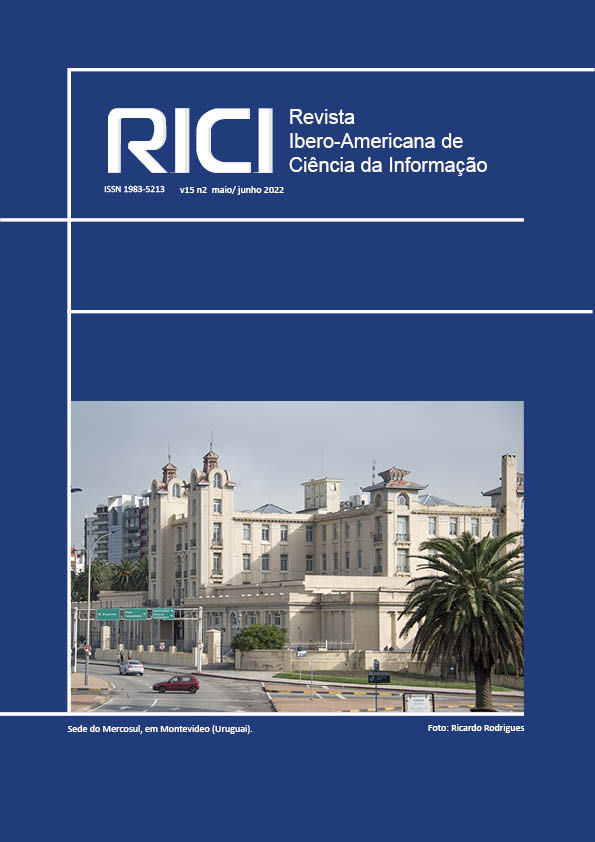Implicit and explicit mediation in legal sentences in poetic format
DOI:
https://doi.org/10.26512/rici.v15.n2.2022.40432Keywords:
Legal sentence, Poetry, Law information, Information mediationAbstract
It deals with the interdisciplinary dialogue in the areas of Information Science and Law concerning their perspectives in relation to mediation. It aims to analyze the sentences in poetic format available on the Migalhas legal news portal, in order to identify the type of mediation (explicit or implicit) and compliance with the guiding principles of mediation law No. 13,140 / 2015 available on the Migalhas legal news portal. It uses bibliographic research as a method, when examining articles from 2015 to 2019 from the mentioned portal. To analyze them, Bardin's content analysis was used with the establishment of the categories mediation of information and poetic sentence, which made it possible to verify that the mediation used in the construction of the sentences was the implicit one, which does not require the physical and immediate presence of the users, in the case of the lawsuits of the jurisdicted citizen. The results also point out that all the guiding principles of the measurement law were fulfilled, with emphasis on informality. The results also point out that the legal branch that most benefited from this literary genre was civil, accounting for three sentences against one of criminal law. Furthermore, jurists claimed that motivation and / or justification for the use of poetry in the sentence as a strategy for valuing the Portuguese language, processes whose themes and conflicts inspired and demanded sensitivity, and the right to free expression of thought. It is concluded that poetry adds value to the legal sentence, regardless of the specific branch that uses it, making it possible not only to comply with the legal guiding principles of the procedural exercise, but also as a standard of conduct, humanizing the performance of the jurist through a language accessible, didactic and playful.
Downloads
References
REFERÊNCIAS
ALMEIDA JÚNIOR, Oswaldo Francisco de. Mediação da informação e múltiplas linguagens. Tendências da Pesquisa Brasileira em Ciência da Informação, v.2, n.1, p. 89-103, jan./dez. 2009. Disponível em:
http://inseer.ibict.br/ancib/index.php/tpbci/article/view/17/39. Acesso em 15 mar. 2021.
ANDRADE, Maria Margarida de. Introdução à Metodologia do Trabalho Científico. 10 ed. São Paulo: Atlas, 2017.
BACELLAR, Roberto Portugal. Mediação e arbitragem. 53. ed. São Paulo: Saraiva, 2016.
BARDIN, L. Análise de conteúdo. Lisboa: Edições 70,2006.
BRASIL. Código de Processo Civil. Brasília: Senado Federal, 2015. Disponível em: Acesso em: 24 abr. 2016.
______. Lei nº 13.140, de 26 de junho de 2015. Dispõe sobre a mediação entre particulares como meio de solução de controvérsias e sobre a autocomposição de conflitos no âmbito da administração pública. Disponível em: http://www.planalto.gov.br/ccivil_03/_ato2015-2018/2015/lei/l13140.htm. Acesso em: 05 de mar. 2021.
______. Lei nº 13.129, de 26 de maio de 2015. Altera a Lei nº 9.307, de 23 de setembro de 1996, e a Lei nº 6.404, de 15 de dezembro de 1976, para ampliar o âmbito de aplicação da arbitragem e dispor sobre a escolha dos árbitros quando as partes recorrem a órgão arbitral, a interrupção da prescrição pela instituição da arbitragem, a concessão de tutelas cautelares e de urgência nos casos de arbitragem, a carta arbitral e a sentença arbitral, e revoga dispositivos da Lei nº 9.307, de 23 de setembro de 1996. Disponível em:
http://www.planalto.gov.br/ccivil_03/_ato2015-2018/2015/lei/l13129.htm. Acesso em: 05 de mar. 2021.
______. Lei nº 13.105, de 16 de março de 2015. Institui o Novo Código de Processo Civil. Disponível em:
https://www.planalto.gov.br/ccivil_03/_ato2015-2018/2015/lei/l13105.htm. Acesso em: 06 mar. 2021.
______. Código de processo civil: Lei n.13.105, de março de 2015. Senado Federal: Secretaria de Editoração e Publicações, Brasília, 2015, 255p. Disponível em: http://www2.senado.leg.br/bdsf/handle/id/507525. Acesso em: 10 mar. 2021.
BRUNER, Jerome. La fabbrica delle storie. Diritto, letteratura, vita. Roma-Bari: Laterza, 2002.
BUENO, Cassio Scarpinella. Manual de Direito Processual Civil. 2. ed. São Paulo: Saraiva, 2016.
CALLEGARI, José Antonio. A narrativa literária no Direito processual: ficção e realidade na distribuição da Justiça judiciária. Revista LTr, São Paulo, v.79, n.03, p. 286 -289, março de 2015.
CAMARGO, Margarida Maria Lacombe de. Hermenêutica e Argumentação. Rio de Janeiro: Editora Renovar ,2011.
FARIAS, M.G.G. A informação como potencializadora da autonomia e da integração social. TransInformação, Campinas, v.28, n.3, p. 323 -336, set./dez. 2016. Disponível em:
https://www.scielo.br/scielo.php?pid=S010337862016000300323&script=sci_abstract&tlng=pt. Acesso em: 13 jan. 2021.
GIL, Antonio Carlos. Como elaborar Projetos de Pesquisa. 6 ed. São Paulo: Atlas, 2019.
HEGEL, G. W. F. Princípios da filosofia do Direito. São Paulo: Martins Fontes, 1997.
LEITE, Carlos Henrique Bezerra. Curso de Direito Processual. 18 ed. São Paulo: Saraiva,2020.
MARINELA, Fernanda. Direito Administrativo. 6. ed. Rio de Janeiro: Impetus. 2012.
MARQUES, Fernando Cristian. Princípio da Oralidade no Direito Processual do Trabalho e sua importância nos precedentes da justiça trabalhista. Boletim Jurídico, Uberaba/MG, v. 22, n. 1162, 2012. Disponível em:
https://www.boletimjuridico.com.br/artigos/direito-do-trabalho/3009/principio-oralidade-direito-processual-trabalho-importancia-precedentes-justica-trabalhista. Acesso em 12 mar. 2021.
NASCIMENTO, Amauri Mascaro. Curso de Direito Processual do Trabalho. 27.ed. São Paulo: Saraiva, 2012.
Downloads
Published
How to Cite
Issue
Section
License
Copyright (c) 2022 Rayara Bastos Barreto, Maria Giovanna Guedes Farias

This work is licensed under a Creative Commons Attribution 4.0 International License.
Copyright Notice
Authors who publish in this journal agree to the following terms:
- Authors retain copyright and grant the journal right of first publication with the work simultaneously licensed under the Creative Commons Attribution License 4.0, allowing the sharing of work and recognition of the work of authorship and initial publication in this journal.
- Authors are able to take on additional contracts separately, non-exclusive distribution of the version of the paper published in this journal (ex.: distribute to an institutional repository or publish as a book), with an acknowledgment of its initial publication in this journal.
- Authors are permitted and encouraged to distribute their work online (eg.: in institutional repositories or on their website) at any point before or during the editorial process, as it can lead to productive exchanges, as well as increase the impact and citation the published work.
















